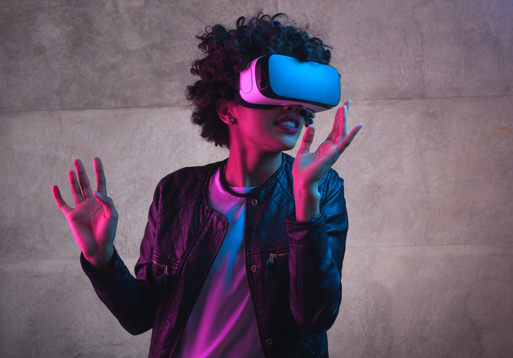How Virtual Reality Is Tackling Unconscious Bias
Virtual reality (VR) has taken the gaming world by storm. The technology brings virtual environments to life by placing a user inside a simulated experience. Many people now own VR headsets so they can enjoy VR experiences at home. But could VR also be an effective way to change behaviour at work?
Forward-thinking businesses are introducing VR as part of their unconscious bias training programmes. But what does tackling unconscious bias really mean and how can VR help?
What is unconscious bias?
Unconscious bias, also known as implicit bias, relates to prejudices that people hold and are not aware of, but can manifest in various forms. Unconscious biases can develop throughout childhood and personal experiences.
Without realising it, these biases are also often due to the influence of popular media forms, stereotypes from education systems or parents, and social conditioning. For example, some people will assume that women are less competent in certain roles at work compared to men, while other biases may relate to age, ethnicity or race.
Unconscious biases can influence our decision making and impact how we relate to one another without us realising we are doing it. As business owners and employees, it is important that we recognise and address unconscious bias at work as it can affect how we relate to colleagues and customers alike. If left untackled, it can lead to discrimination and unfair treatment, making those at the receiving end feel excluded, frustrated and hurt.
In order to ensure that their businesses operate in a way that is fair for all, many businesses are tackling unconscious bias by offering education and training programmes, and this now includes virtual reality.
Examples of Unconscious Bias In the Workplace
- Gender Bias
- Ageism
- Beauty Bias
- Name Bias
- Cultural/Racial Bias
- Conformity Bias
- The Halo/Horn Effect
- Authority Bias
- Confirmation Bias

Tackling Unconscious Bias with VR?
The unique experience that VR offers can be a transformative one. The simulated environments they place us in, helps us to see the world from a new perspective.
Essentially, VR experiences in the workplace allow us to walk in someone else’s shoes. The roles we experience when using VR, unconsciously have the power to shift the way we think and behave in the real world...
For this reason, virtual reality programmes are being used by progressive businesses as part of unconscious bias training. One of the VR training programmes that is tackling unconscious bias drives empathy, inclusion and awareness in the business world is Equal Reality.
Set up by Annie Harper as a tool to tackle the underrepresentation of women on executive boards, Equal Reality recreates workplace scenarios using VR. This particular diversity training content allows employees to experience a day at work from a woman’s perspective.
Equal Reality gives employees the opportunity to experience how certain biases play out in different situations. Each employee begins to understand how biases look and feel, and develop their own methods for tackling these.
Because unconscious bias is not a conscious decision, it can be hard to shift through other training methods. Enabling employees to experience unconscious bias training in VR,rather than telling them about it, empowers them to recognise and evolve their own behaviour.
For many businesses, tackling this issue is a major step towards increased diversity both internally and as customer-facing brands. Over time, this form of cognitive behavioural training can help to reduce unconscious bias and create a more inclusive workplace.
What does the research say about tackling unconscious bias with VR?
Scientists and researchers agree that VR has an important role to play in cognitive training and therapy and has been used worldwide.
A 2018 study found that VR had a marked effect on racial bias. In the study, participants who had played as a black avatar during a VR experience, showed less racial bias in a courtroom situation than those who had not.
The results show that using VR to see the world through the eyes of someone of a different race can reduce our unconscious racial bias.
Another study describes the effect VR can have on our thought processes:
“You know that the events you see, hear and feel are not real events in the physical meaning of the word, yet you find yourself thinking, feeling and behaving as if the place were real, and as if the events were happening … From a cognitive point of view, you know that there is nothing there, but, both consciously and unconsciously, you respond as if there is.”
Virtual reality really is helping tackle unconscious bias around the world.
3 Key Points about tackling unconscious bias
- Progressive companies are using VR to revolutionise the way they deliver unconscious bias training. Because of the way VR allows employees to experience situations from another person’s perspective, it has the power to shift biases people were not aware they had.
- The use of VR has been shown to be a powerful cognitive training tool that can help to shift behaviour in a non-judgmental, effective way.
- Rather than telling people about unconscious bias, VR allows employees to experience it first-hand. This helps them to develop meaningful strategies to tackle it in the workplace and beyond.
If you are interested in progressing or starting a career in tech, particularly in VR development, we have a range of coding and IT courses that will enable you to keep up with the innovations in the tech industry. Explore our courses to learn more.
Related Articles
 Career Advice
Career AdviceNew year, new career – how to best prepare yourself for 2026
This is your go-to guide for preparing for a fresh start, understanding your options, and seeing how Learning People can support you every step of the way.
Read More Cyber Security
Cyber SecurityUnderstanding the different types of cyber security threats – December 2025
Discover the types of cyber security threats and how professionals tackle challenges like ransomware, phishing, and insider threats. Explore the risks posed by DDoS attacks and IoT vulnerabilities, and learn how Learning People’s expert-led cyber security courses prepare you for a future-proof career.
Read More IT
ITMost in Demand IT Certifications (December 2025)
By combining our globally-recognised expertise and the latest industry reports, we have identified the top five certifications for IT professionals.
Read More Tech
TechSoft Skills More Necessary Than Ever According to New Report
In a world where AI and machine learning is a top desired skill for businesses globally, are we neglecting the human element?
Read More
